Home » Industry Watch » The Technological
John GAYWhat a great guy.
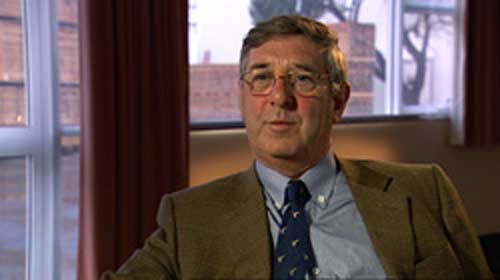
John GAY's worked with wood all his life. He's risen through the ranks to become CEO of Gunns the Tasmanian monopoly in the wood industry.
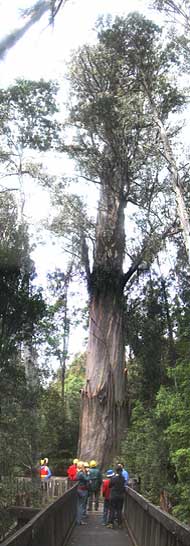 His hands are dirty. His hands are dirty.
Australia are currently besieged by an onslaught of bushfires. They have 4,000 firefighters out fighting the blazes and as yet there is no end in sight. It's thought most of the fires were started by lightning strikes but for some of the bigger blazes it's still impossible to get close enough to them to find out more.
Another recurring thought is that it's the destruction of the ecology - the greenhouse effect - causing a lot of this.
Tasmania has the tallest trees in the world. They're called eucalyptus regnans and they can reach to almost 500 feet. And they're beautiful. Treebeard would have felt right at home.
But they're being cut down. They're being slaughtered today. And it's all the doing of Gunns with John GAY at the helm. John GAY and his company are slaughtering this planetary resource to be able to sell WOOD CHIPS to the Japanese. The Japs use - and throw away - a lot of chopsticks.
And it's not always easy what with the powerful 'green' lobby in Australia, but John GAY has even more powerful friends in high places. Who somehow always seem to benefit financially by the strides Gunns make.
Paradise Lost - with Napalm
Richard Flanagan writes in The Guardian on 21 April 2004.
I am writing this in our autumn, once Tasmania's most beautiful season. But the china-blue skies are now nicotine scummed, as smoke from the burning of old-growth forest floats over Hobart, an inescapable reminder that the destruction of ancient woodland - like no other in the world - is accelerating.
In Tasmania, an island the size of Ireland whose primeval forests astonished 19th-century Europeans, an incomprehensible ecological tragedy is being played out.
Recent calls from Britain to boycott Tasmanian goods and tourism are not going to end logging. But in an Australian election year, with the forests emerging as a major issue, they form part of a chorus of international condemnation that shows Australians that the forests are not just a natural resource, but are globally significant wild lands.
Rainforest is being clearfelled and then burnt with napalm. The world's tallest hardwood trees, eucalyptus regnans, are being reduced to mud and ash. And the monocultural plantations that replace the old growths soak up so much groundwater that rivers are drying up.
Compound 1080, a lethal poison, is laid to kill off native animals that might graze plantation seedlings. In the resulting slaughter, wallabies, kangaroos, possums, and protected species such as wombats, bettongs and potoroos, die in slow agony.
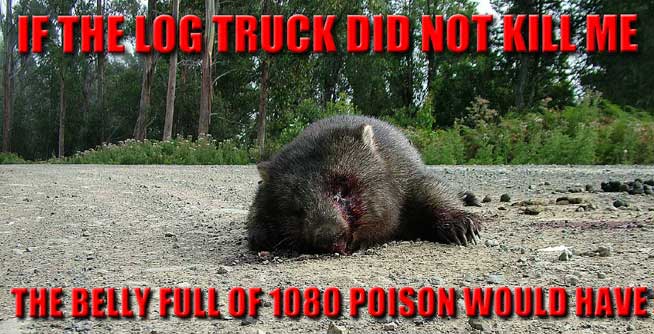
The survival of extraordinary creatures such as the giant Tasmanian freshwater crayfish - the largest in the world - is in doubt because of logging. Scientists warn that numerous insect species still unrecorded are disappearing in the conflagration. Local people are finding their water contaminated with atrazine, a potent weedkiller.
Logging is an industry driven solely by greed. It prospers with government support and subsidies, and it is accelerating its rate of destruction, so that Tasmania is now the largest hardwood chip exporter in the world. And Gunns, the largest logging company in Australia with a monopoly in Tasmania, is making record profits selling these forests as woodchips, which are in turn made into paper and cardboard.
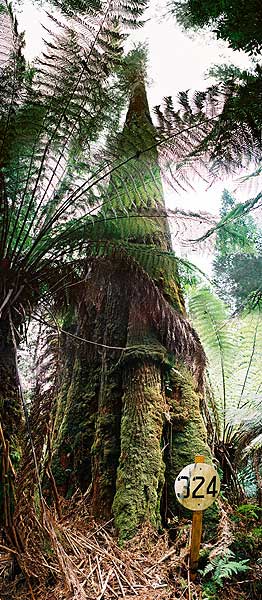 But the woodchippers are destroying not only Tasmania's natural heritage, but also its parliament, its polity, its media and its society. The close relationship which leading Tasmanian politicians enjoy with Gunns, goes beyond sizeable donations to both major parties; it has given rise to a political culture of bullying, cronyism and threats, a culture that allowed the state's electoral system, under a 1997 Liberal-Labour deal, to be altered to minimise Green representation. But the woodchippers are destroying not only Tasmania's natural heritage, but also its parliament, its polity, its media and its society. The close relationship which leading Tasmanian politicians enjoy with Gunns, goes beyond sizeable donations to both major parties; it has given rise to a political culture of bullying, cronyism and threats, a culture that allowed the state's electoral system, under a 1997 Liberal-Labour deal, to be altered to minimise Green representation.
Because of the forest battle, a subtle fear has entered Tasmanian public life; it stifles dissent and is conducive to the abuse of power. To question or to comment is to invite the possibility of ostracism and unemployment.
The reality, relentlessly denied with lies, is that logging old growth brings neither wealth nor jobs to impoverished rural communities. Most wealth made out of woodchips flows out of the state; less than 15% of Gunns' profits stay in Tasmania, which remains the poorest Australian state. Contrary to the government's claim that 10,000 jobs depend on old-growth logging, John Gay, Gunns' managing director, recently admitted that only 480 jobs were at stake.
However, the giving away of such an extraordinary resource does threaten Tasmania's broader economic prospects. Key industries in which job growth is concentrated, such as tourism and fine foods and wines, trade as much on the island's pristine image as they do on the products they sell, and there is growing concern at the damage being done to Tasmania's name by images of smouldering forest.
Since woodchipping began 32 years ago, Tasmanians have watched as one extraordinary place after another has been sacrificed. Beautiful places, holy places, lost not only to them, but for ever. They overwhelmingly want the practice of old-growth logging ended - Wilderness Society polls show that 69% of Tasmanians are opposed to the practice.
But with both major political parties in Tasmania as one in their rigid support of Gunns and old-growth logging, Tasmanians cannot stop this coalition of greed and power from within their island. Change can only be brought about by the Australian government, and it will only act when the issue becomes one of inescapable national shame.
Of course it can be argued that the destruction of one more unique piece of our natural world, while regrettable, is small change next to the horror of Madrid, or the tragedy of Iraq. But in the lineaments of the struggle in a distant island, it is possible to see a larger battle, the same battle the world over - that between truth and power.
Günter Grass, writing of Tasmania's forests, has described their destruction as an aspect of the same attitude that led to Nazi book-burnings. Could it be that, when all our skies appear to be darkening, the great forests of Tasmania are a symbol of hope for us all?
For GAY the Gift of Gab
Environmentalists have tried for the longest time to unsettle John GAY with invariably less than satisfactory results. Put simply, John GAY has no shame, no remorse. Here are a few choice examples from a 'Four Corners' interview by the ABC.
In the first notice how he moves from a firm denial to a completely different story without breaking stride.
TICKY FULLERTON: So you're not logging old growth forests?
JOHN GAY: We don't log deliberately old growth forests. We have an area given to us as an industry by the RFA, the Regional Forest Agreement that sets out an area for Tasmania to have a sawmilling industry, a veneer industry and that is what we log today.
TICKY FULLERTON: In the Regional Forestry Agreement though presumably some of that land is old growth.
JOHN GAY: There is a percentage. We're logging about 1% of that area in the agreement and that was put in there to make sure there was a sustainable sawmilling industry in Tasmania.
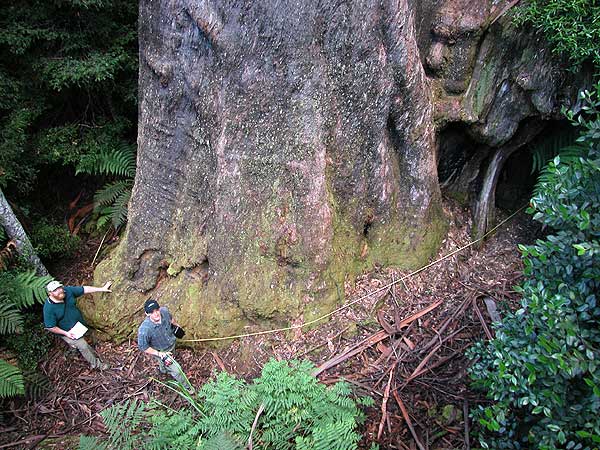
In this next excerpt notice how he's moved from evading the question to a shocking truth.
TICKY FULLERTON: You are the largest chip exporter in Australia, how much of the market does Tasmania have?
JOHN GAY: We have 23% of the Japanese market.
TICKY FULLERTON: And how much of the overall Australian market do you have?
JOHN GAY: Oh we are probably supplying, of the total exported woodchips in Australia, probably 80%.
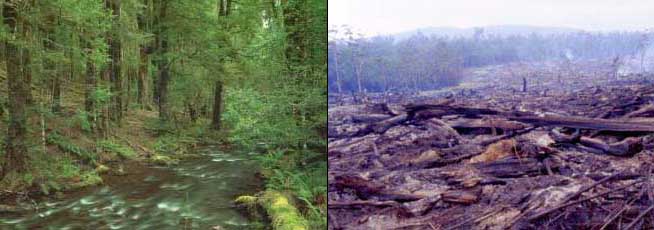
Watch here how he does a dance the Minitruth would be in awe of.
 TICKY FULLERTON: 85% of your chips I think come from native forests, some of it is still old growth, why when every other state has thought better of it are we still clearfelling old growth forest for woodchips? TICKY FULLERTON: 85% of your chips I think come from native forests, some of it is still old growth, why when every other state has thought better of it are we still clearfelling old growth forest for woodchips?
JOHN GAY: Well we're not actually clearing old growth forests for woodchips. This state and the Forestry Tasmania operates this industry on a sustainable yield for sawlogs and for added-value and that creates logging of those areas and those we are taking the residue of those areas not the chipping business. Ten years ago, fifteen years ago those areas were burning the resource.
TICKY FULLERTON: I tell you why I say that. I mean I've been taken to an area just a couple of days ago where there was a Myrtle tree that must be 800 years old and that is in a coupe which is supposed to be logged this year.
JOHN GAY: OK there will always be one tree or one issue in every, and if it's 800 years old, it's as old as you say it is I am sure that that tree under the RFA will be reserved.
TICKY FULLERTON: How do you know though if you've got this big clearfelling operation going, how do you know until you get to these old trees?
JOHN GAY: We don't know until we get to them that they are there. When they are there under the Forest Practices Code they will be reserved.
But here is where he really shines: a round table with Graham Davis moderating.
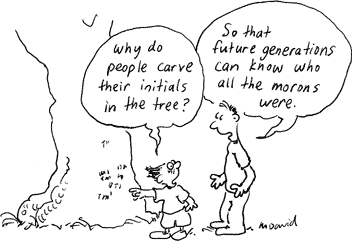 GRAHAM DAVIS: We're on the site Gunns wanted to log with local activist Andrew Ricketts - the man who blew the whistle on what was happening here. GRAHAM DAVIS: We're on the site Gunns wanted to log with local activist Andrew Ricketts - the man who blew the whistle on what was happening here.
ANDREW RICKETTS, REEDY MARSH CONSERVATION GROUP: If you had self-regulation on the highways and you were driving down the road at 120km/h, would you pull yourself over and stop and write yourself out a ticket?
GRAHAM DAVIS: No.
ANDREW RICKETTS: No, you wouldn't. And we expect this system to work.
GRAHAM DAVIS: Andrew Ricketts points out an endangered forest community of shrubby ovata viminalis, varieties of eucalypt. Nearly 90 percent has been cleared since white settlement. Most of what's left is on private land like this.
ANDREW RICKETTS: In this region it is about 87 percent depleted.
GRAHAM DAVIS: It's true, isn't it, that you placed a moratorium on logging any shrubby ovata viminalis? Is that correct?
GRAHAM WILKINSON: That's correct.
GRAHAM DAVIS: An absolute moratorium?
GRAHAM WILKINSON: Yes.
GRAHAM DAVIS: Do you know whether these two forest practices officers of Gunns knew that?
GRAHAM WILKINSON: Those officers would have been told there was a moratorium in place.
GRAHAM DAVIS: They would have been?
GRAHAM WILKINSON: Yep.
GRAHAM DAVIS: So why are these trees within the parameters of this coupe, as it's called - the area delineated for logging? And why is there no mention of this endangered forest community on the document Gunns prepared here?
JOHN GAY: No, I can't explain that.
GRAHAM DAVIS: You can't explain it?
JOHN GAY: No, I can't.
GRAHAM DAVIS: Have you...
JOHN GAY: I don't know anything about it.
GRAHAM DAVIS: Doesn't this give rise to the suspicion that Gunns is playing fast and loose with the rules?
JOHN GAY: No, I don't think it does. Don't exaggerate. It is unreasonable for you to say that. We haven't been doing that and we don't intend to.
GRAHAM DAVIS: How can you say that when you say you haven't investigated it?
JOHN GAY: Because it hasn't been put to my desk yet.
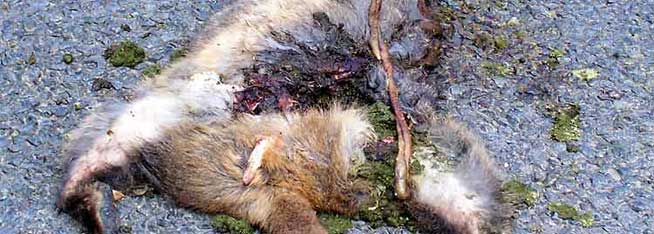
The story goes even deeper into the realm of corruption as a click on that link reveals. But one of the most abrasive exchanges ever - one that has people all over the planet reeling - is the following. And it's asked because John GAY places out 'poison bait' (1080 poison) to clear the lands for his woodsmen.
GRAHAM DAVIS: How do you feel about protected species dying for your business?
JOHN GAY: Well, there's too many of them and we need to keep them at a reasonable level.
GRAHAM DAVIS: You're saying there's too many wombats and ring-tailed possums?
JOHN GAY: Yes, most certainly.
GRAHAM DAVIS: Why are they protected then? Why are they classed as endangered?
JOHN GAY: Well, because the numbers are getting too great and the ring-tailed possum is a very small proportion of this. It's usually the brush possums that are poisoned, not ring-tails.
GRAHAM DAVIS: Well, how can you say that, though, when you concede that this thing kills everything?
JOHN GAY: Well, that everything that goes there to eat, but I believe it is an acceptable practice.
GRAHAM DAVIS: It is acceptable practice to knock off all the wildlife in the surrounding areas, so that you can put your tree seedlings in?
JOHN GAY: Yes.
See Also
Gunns Limited Website
Conclusions on 'El Grande'
Status of Tasmanian Mammals
Four Corners Interview with John Gay
McGunns LAWSUIT by GUNNS Limited
Mark Davis: A Few Big Australian Trees
Irony Party Corporate Slut o' the Month
Gunns, Profits, Mates and the National Trust
Tasmanian Log Truck Road Kill Nightmare - The Morning After (Warning for Stark Imagery)
|